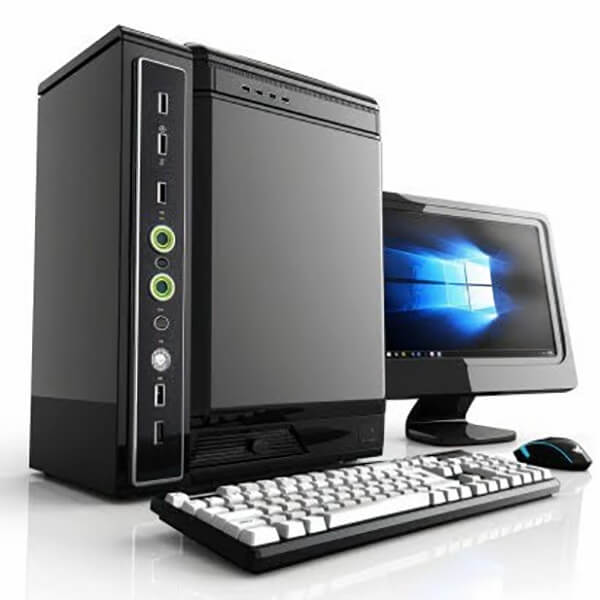
The article explains how to pack a PC for moving. It tells you how to take it apart, wrap it safely, and put it in boxes. It also gives tips for moving the packed computer.
I. Introduction
Relocating your desktop computer doesn’t have to be daunting. At Qshark Moving Company, we’re here to make your move smooth and stress-free. We’ll cover everything you need to know, including:
- What You Need Before You Start
- Disassembling the Desktop Computer
- Packing the Computer Tower
- Packing the Monitor and Peripherals
- Sealing and Labeling the Boxes
- Final Checks and Transport Tips
II. What You Need Before You Start
Packing your PC for moving doesn’t have to be a nightmare. Before you get started, let’s make sure your precious files and prized possessions are prepped for the journey.
- Save Your Stuff: This is priority number one. Save in the cloud, use an external hard disk, or another backup method to copy all your important files, photos, and documents. A PC meltdown during the move is bad, but losing your irreplaceable data is a disaster.
- Box it Up: Find sturdy cardboard boxes; ideally, the original box for your PC tower is perfect. You’ll also need packing peanuts or bubble wrap for cushioning, packing paper to fill in empty spaces, and packing tape to seal everything shut. Don’t forget to have a permanent marker for labeling your boxes.
III. Disassembling the Desktop Computer
Packing your PC for moving is like prepping your best friend for a sleepover at a new place. Here’s how to pack a desktop computer for moving:
- Shutting Down and Unplugging: First, shut down your computer like you normally would. Then, unplug all the cables from the back of the tower, including the power cord, monitor cable, and any USB devices.
- Labeling Cables: Before unplugging anything, take a photo of how each cable is connected. For good measure, add a label with a number to each cable for easy reassembly at your new home. You can also use a rubber band or zip tie to keep the labeled cables bundled together.
- Removing Peripheral Devices: Unplug your external devices like your keyboard, mouse, and speakers. Now’s a good time to pack them up in a separate box with packing peanuts or bubble wrap for extra protection.
IV. Packing the Computer Tower
Your PC tower might be a powerhouse, but it needs some TLC during a move. Here’s how to turn it into a packing fortress:
- Securing the Internal Components: Before you bubble wrap the whole thing, think about the big guys inside your tower – the graphics card and any hefty heatsinks. If they can be easily unscrewed, consider taking them out and wrapping them separately for extra VIP treatment.
- Wrapping the Tower: Wrap the entire tower in multiple layers of bubble wrap. Treat it like a birthday gift for yourself – the more layers, the better the surprise protection against bumps and bruises.
- Placing in Box: Once it’s wrapped tight, carefully stand the tower upright inside a sturdy box. Fill empty areas with packing peanuts or scrunched-up packing paper to create a snug fit and prevent your precious PC from shifting during its journey.
V. Packing the Monitor and Peripherals
Here’s how to keep your monitor and its fellow tech warriors safe during your move:
- Protecting the Screen: First things first, grab some bubble wrap and treat that screen like royalty. Wrap it generously, making sure there are no gaps for bumps and bruises.
- Packing the Monitor: If your monitor’s a real whopper, consider giving it a separate box for ultimate protection.
- Fill the Gaps: Once your monitor’s all snuggled in, use packing paper or leftover bubble wrap to fill any empty spaces. This will prevent the monitor from shifting around during the move.
- Storing Peripheral Devices: Remember your keyboard, mouse, and other goodies! Wrap them individually and tuck them into any leftover space in the box. Now that’s how to pack a PC for moving like a champ.
VI. Sealing and Labeling the Boxes
Now that your precious PC is nestled safely in its box, it’s time to seal it up securely. Grab your packing tape and get ready to create a strong closure. Here’s how:
A. Sealing the Boxes
- Seal it Tight: Use packing tape to create an H pattern on the bottom and top of the box. Then, go all the way around the box, sealing each seam with generous strips of tape.
- No Weak Spots: Make sure you tape up all the edges where the cardboard flaps meet. This will prevent any tears or unwanted openings during the move.
B. Labeling
We’ve secured the fort, but explicit instructions are key for a smooth unpacking process. Here’s what to write on your box:
- Bold and Clear: Write “Fragile” and “This Side Up” in big, bold letters on multiple sides of the box.
- Clear Content: Don’t be shy! Label the box clearly with “PC” or “Desktop Computer,” so you (or the helpers) know exactly what’s inside.
VII. Final Checks and Transport Tips

It’s time for a quick check-up! Make sure your PC is securely packed in the box and all the cables are inside.
- Final Inspection: Run your fingers around the box. Is everything sealed tight? Awesome.
- Loading into the Vehicle: In your moving vehicle, treat your PC boxes like VIPs. Place them in a secure spot where they won’t get jostled around. Think snug against a wall, not bouncing in the back.
- Handle with Care: You wouldn’t toss a birthday cake in the car, would you? Treat your PC boxes with the same respect during loading and unloading. Strong arms and a smooth ride are the way to go.
VIII. Conclusion: How to Pack a Desktop Computer for Moving
So, there you have it! With a little care and these easy steps, your trusty desktop PC will arrive at your new digs safe and sound, ready to conquer virtual worlds once more. Remember, a little bubble wrap and some planning can save you a major headache.
For a truly stress-free move, why not consider getting a professional quote from Qshark Moving Company? We’ll handle the hard stuff so you can enjoy the thrill of your new adventure. Now get packing, and happy moving!


 How to Pack Artwork for Moving
How to Pack Artwork for Moving How to Move a Pool Table
How to Move a Pool Table What to Get Rid of When Moving
What to Get Rid of When Moving How to Pack a TV for Moving
How to Pack a TV for Moving How to Label Moving Boxes
How to Label Moving Boxes